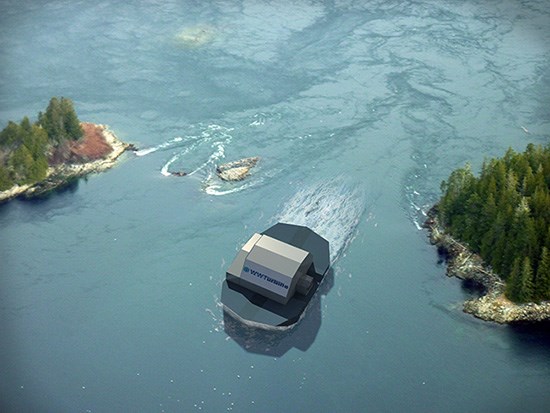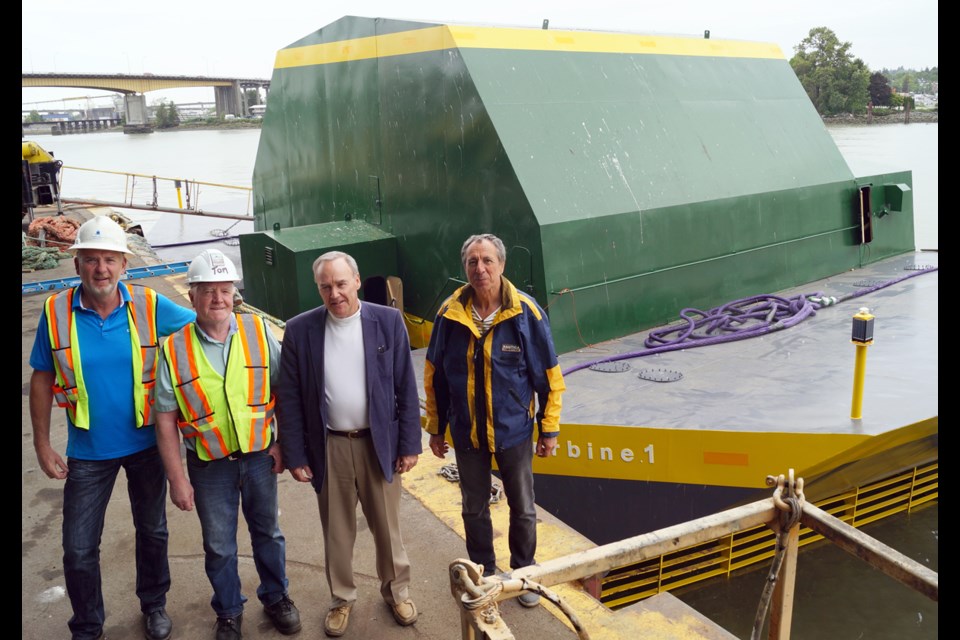A Richmond shipyard has deployed what could be an energy game-changer for remote communities along B.C.’s coast.
Meridian Marine Industries spent the better part of a year fabricating Lions Bay-based Water Wall Turbine’s 550-ton, tidal energy vessel, capable of generating up to one megawatt of power for Dent Island Lodge, northeast of Campbell River.
Meridian’s president Jim McFadden explained the project represents a significant investment for his company, which specializes in mobile ship repairs and marine fleet maintenance, including BC Ferries vessels.
Meridian actually took a loss on the prototype project, which launched into the Fraser River last week, explained McFadden. Normally, the company has about 12 employees, but it took on about 25 more, including eight apprentices and Aboriginal workers to complete the vessel in its shipyard, next to the Canada Line Bridge. More than 24,000 man-hours of labour went into the fabrication process.
“We’re hoping it’s a success and we get repeat orders. Clean energy is a new field for us. Even though it’s a vessel we’re building here, there are different components we haven’t worked with before. We also faced some design challenges,” said McFadden, whose workforce specializes in the likes of welding, hydraulics, piping, machining and fire protection.
“No one’s ever built one of these before. There are conceptual drawings, changes in design as you go along . . . We knew there would be a loss building this. We’re gambling on our future. Sometimes in a business, you have to step up and take a gamble. Most businessmen have done that. Some end up the right way, some end up the wrong way, but we’re hoping this will be a success,” said McFadden.
The portable vessel floats on the water and is about 28-metres long and 17-metres wide. It has a draft of 4.5 metres and is about three-quarters the size of a Vancouver SeaBus.
The vessel must withstand strong West Coast storms, noted Russ Baker, vice-president of strategic business development for Water Wall Turbine, the vessel’s developer.
“There’s so much steel in here it would rival an icebreaker. You can imagine if it’s in a 10-knot current and all those deadheads are coming at it,” said Baker.
McFadden’s crew was charged with putting together all the pieces: Blades, turbine, generator, haul, outer shell and electrical components.
Baker said the prototype took nine years to develop. He said if things go well, the company could produce several vessels each year, hopefully with Meridian.
“With the next one, you can refine the building, cut back on man hours and claw profits back,” said McFadden, noting the prototype needed to be fail-proof.
“Hopefully we can pump these things out of here, two at a time, it would be perfect,” said McFadden, who built his company from the ground up about 20 years ago.

While the vessel has a 1-MW capacity, the Dent Island prototype will only generate up to 500 kilowatts — more than enough to power the remote lodge, which presently spends about $250,000 annually on diesel.
The vessel captures tidal movements in a narrow channel (fast moving water is necessary) behind the lodge. It’s connected to a Tesla energy storage system, with a 900-metre power cable running along the ocean floor.
“The beauty of tidal energy, as opposed to solar or wind or any other renewable energy, is that it’s predictable,” noted Baker.
When the tides are churning water through the eight massive blades and turning the turbines, peak energy production could power 250 homes. When the tide is slack, excess power is stored by the Tesla batteries onshore. A backup diesel generator still kicks in, if there’s an emergency.
The vessel, which has an estimated lifespan of up to 40 years, could provide power for remote villages or other lodges.
“They all need power and they’re all on expensive diesel,” noted Baker.
Presently, diesel costs the lodge about 65 cents per kilowatt. Baker’s target is to bring costs down to 15 cents. An added bonus, he noted, is the fact diesel barges will no longer need to be shipped to Dent, eliminating spill risks. And marine mammals, such as seals, could easily go for a ride through it, without being harmed. A grated gate prevents them from doing so, however. The vessel is approved by Environment Canada, noted Baker.
The prototype vessel cost about $5.6 million in total, including a federal Clean Energy Fund grant of $2.25 million. The grant, said Baker, helped investors mitigate risk. Accepting the prototype also saves the lodge money, if everything goes accordingly.
Meridian was founded by McFadden and business partner Tom Ferns in 1995, who met one another while working in a Port of Vancouver shipyard, after emigrating from Britain. Skilled labour is supplied by the Marine Workers and Boilermakers Industrial Union. The company moved from Vancouver to its existing location in Richmond three years ago.



